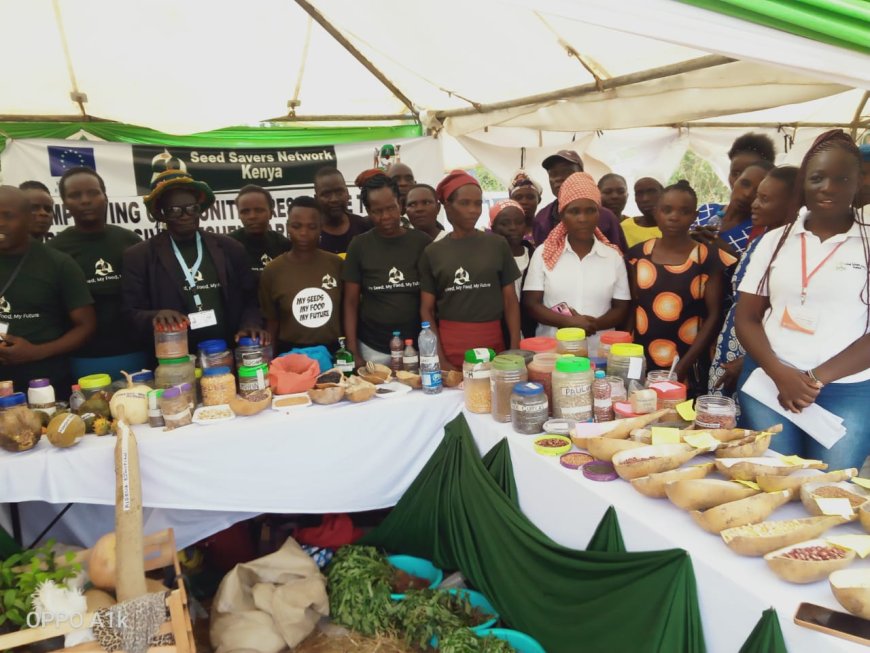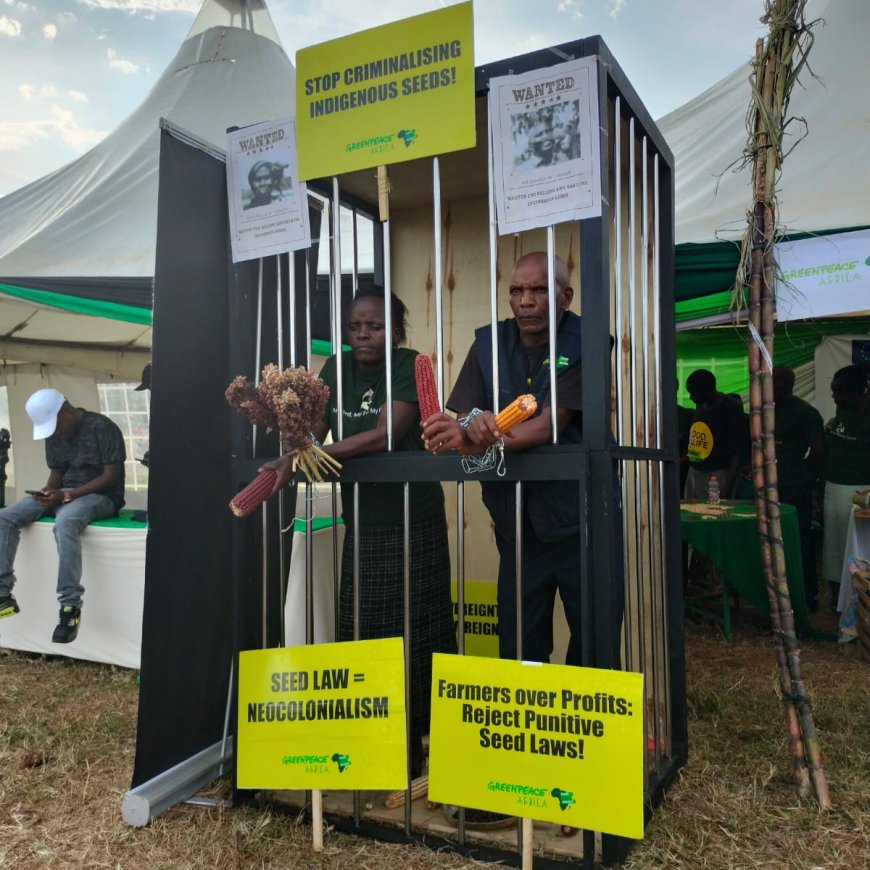Kenyan Farmers Protest Against Punitive Seed Laws
Kenyan farmers are currently staging protests against what they perceive as punitive seed laws
By Sharon Ambani
Kenyan farmers who engage in organic and indigenous agriculture are currently facing concerns about potential legal repercussions due to the Seed And Plant Varieties Act (Cap 326).
This legislation could restrict their ability to share, exchange, or sell seeds that haven't been certified by the Kenya Plant Health Inspectorate Service (KEPHIS). The impact of this law on traditional farming practices has sparked apprehension within the farming community.
In one of the stands at the agricultural exhibition during the World Food Day celebrations at the Bukura Agricultural College in Lurambi Constituency of Kakamega County, I met two sad-looking farmers locked in a cage.
Their hands, which are holding yellow and red maize cobs and a calabash of beans, are tied with chains. There are boards hooked to the cage, with scribbled messages on each.
One of the farmers, Francis Ngiri from Makongo Village in Elementaita, says this act is a symbol of a vulnerable farmer oppressed by the existence of a punitive law.
Ngiri notes that the indigenous seeds he uses on his farm were passed down his lineage. He says practicing this form of agriculture allows him to conserve and appreciate his culture that has existed for many generations.
At another stand, I met farmer Steven Simon from Khwisero Constituency. His booth displays a variety of indigenous seeds, including vegetables, millet, sorghum and maize, among others seeds. Upon my interaction with him, he revealed that he has practiced organic farming since 2012 because of the economic, health and environmental benefits that come with it.
“Nowadays, we are affected by many diseases caused by the many chemicals used in farming. Organic farming allows me to use indigenous seeds, organic manure and naturally made preservatives, making my products safe and ready to use,” says Steven

Indigenous Farmers, Photo Sharon Ambani
However, Simon and Ngiri are now living in fear of losing what they hold dearly if the government implements the Seed and Plant Varieties Act (Cap 326).
This Act of Parliament mandates KEPHIS to regulate seed transactions in the country. It confers the regulator power to, i)test and certify seeds, ii) come up with index names for plant varieties, and iii)control seed importation among other roles as stated in the 35 sections of the law.
The law prevents farmers from sharing or selling seeds that are yet to be regulated by KEPHIS. The process entails testing the seeds by assessing them against certain factors, including genetic characteristics, resistance to disease and germination viability.
Studies have shown that testing and certifying seeds is essential in ensuring farmers get high-quality and increased yields.
Anyone found breaching the act may be subjected to a jail term of up to two years or get fined an amount of up to one-million Kenyan shillings or both.
The informal seed sector is very significant since 70 per cent of the major seeds in Kenya come from it, with most of its users being small-scale farmers. Usually, these farmers share, exchange or buy uncertified seeds among themselves.
The farmers shared a concern that implementing the act might affect indigenous farming. They now blame the legislature for passing a law that will oppress small-scale farmers.
“The certification process is complicated for us as small-scale farmers. Why do we have to spend an outrageous amount of money to verify a single variety of seeds? We cannot compete with the big companies since we plant food for subsistence use only,” said the farmers.
Stakeholders now call for the protection of such farmers, saying that they play a crucial role in achieving food security in the country.
Mercy Ambani, an officer from Seed Savers Network says that they work closely with vulnerable farmers who are not in a position to afford the certified seeds.
Her organization has set up seed banks in several parts of Western Kenya to allow over 400 registered farmers access to indigenous seeds. In addition, they carry out capacity building to teach farmers how to plant and store the seeds to ensure they do not go extinct.
“Most farmers we work with have fewer resources and cannot afford to buy seeds every season. We have built seed banks in different places where they pick the seeds and bring a portion for storage after harvesting, ready for the next season. We aim to conserve biodiversity. We also protect the farmers from people who claim their seeds without acknowledging them," said Ambani
Ambani says having such laws might hinder the farmers' ability to produce food for their families and the community at large. She now calls on other stakeholders to rise and amplify the voices of the vulnerable farmers.
Elizabeth Atieno Opolo from GreenPeace Africa says that organic farming is one way of fighting the climate and food insecurity crises Kenya is currently facing. She has, however, slammed members of Parliament and the government in general for not involving the farmers before passing the law.
“This year's World Food Day theme is water is life, water is food, leave no one behind. Using indigenous seeds is one weapon that our farmers can use to fight climate change and to fight water scarcity. But we have a situation where the government is taking that weapon away from them. That is why I say this is purely business because the process of certifying these seeds is very technical and expensive and can only be afforded by big companies,” says Atieno.
She revealed that GreenPeace Africa has gone to court to see that the law gets amended to benefit the farmer rather than a few individuals.
The complaints raised by these farmers and stakeholders are coming at a time when Kenya is fighting to achieve food security by the year 2030. Currently, about 4.4 million Kenyans are facing high levels of Acute Food insecurity. This situation may worsen due to the ever-increasing population, adverse effects of climate change and worldwide inflation.
There is a need to implement policies that will drive sustainability in the agricultural sector since it is the backbone of our economy.
What's Your Reaction?



















































